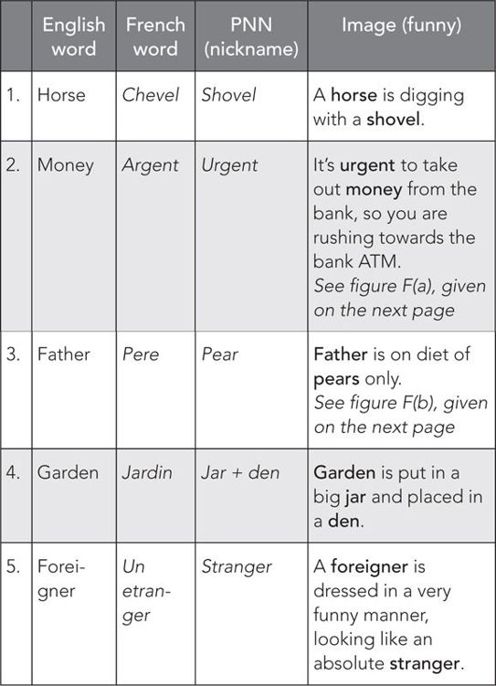How to Memorize Anything (14 page)
Read How to Memorize Anything Online
Authors: Aditi Singhal,Sudhir Singhal
Tags: #Self-Help, #Meditations

You take it to canteen. There you see a huge
filter machine
.
Now try making further visualization for the above on your own
:
Using PNN we can also memorize information like:
Countries–Currencies
Inventors–Inventions
Books–Authors
Minerals–Places
Scientific researches–Scientists
Elements in a periodic table
This is not only useful in day-to-day life, but a must method to be learnt for those appearing in competition exams, where a lot of general knowledge is required. We will talk about it in more detail in the student’s section.
We can also memorize vocabulary, difficult words with their meaning, and foreign language words using this technique, which we will see in the next chapter.
C
HAPTER AT A GLANCE
- Information containing difficult, unfamiliar words or strange names of places and people which are hard to visualize can be memorized using PNN (personal nick name) method.
- In this method, we substitute the unknown, difficult word with a familiar sounding word which we can visualize and associate it with the given information.
- The substituted word or the nickname can be one word or a group of words.
- It is not always necessary to make PNN according to a similar sound of the given word. Any other knowledge or related image can serve as a nick name for that word.
- This method is used for memorizing things in general like:
- Abstract words
- Technical terms
- Scientific terminology
- General facts
- Names of people and places
- Abstract words
- Or related to information like:
- Countries–Currencies
- Inventors–Inventions
- Books–Authors
- Minerals–Places
- Scientific researches–Scientists
- Elements in a periodic table
- Difficult vocabulary with meaning
- Foreign language words etc.
- Countries–Currencies
7
LEARNING FOREIGN LANGUAGE WORDS AND ENGLISH VOCABULARY
L
earning a foreign language is the latest trend these days but sometimes it becomes a necessity, like when you are travelling abroad for business or going on a vacation. There are many countries where just knowing English is not enough. In such a scenario, it becomes important for a traveller to learn the local language so that he/she is able to communicate at least basic things like asking for directions, reading a menu card, asking the price for a product etc.
To learn a foreign language, if you follow conventional techniques, it is possible that you will take a few months or even a year to be able to speak in that language.
But here I can teach you a method through which you will be able to master the basics of any given language in as quickly as 10 days! Yes! That’s exactly what I mean. In just 10 days!
Though you still need to practice speaking the language to get your grammar and sentence structure correct, most people will agree that their biggest challenge in learning a new language is remembering the new words and their meanings at a good speed without getting confused. We can master a new language words by using the PNN (Personal Nickname) method along with the AIR principle.
MEMORIZING FOREIGN LANGUAGE WORDS
As any word of a foreign language may seem abstract, meaningless, and nonsensical to you, you will not be able to form a mental picture of it. So the first step is to transform a foreign word into a form that is easily understandable and can be visualized in your mind.
For example, let’s take a Spanish word like
‘cuarto’
which means
‘room’
. Now at first glance it will not make sense to someone who is unfamiliar with Spanish language. Therefore, it becomes difficult to visualize it.
If you want to commit this word in your long-term memory so that it becomes easy to recall, you have to transform it into a form that you can easily visualize.
If you speak the word ‘cuarto’ (pronounced as quart-o) slowly, you will find a familiar and a similar sounding word in it i.e. ‘quarter’. Quarter is something meaningful that you can picture in your mind. Now, why not make a ridiculous or illogical association, as you have already learned, between quarter and room?
In Spain, rooms are divided into small quarters.
The next time you try to recall the Spanish word for ‘room’, your ridiculous association will help you recall quarter, which will further help you recall that the word is ‘cuarto’.
Let’s take one more example.
In
French
,
‘Merci’
means
‘Thank you’
.
Just imagine you won a lottery of one lakh rupees and you go to temple or church to thank God. Imagine yourself bending in front of God and saying ‘Thank God for your “Merci”.’

T
HE
T
RICK
To remember a foreign word and its English meaning, associate the English meaning to the substitute word or the nickname you have given for that foreign word.
Let’s try to remember these five
French words:


Figure: F(a)

Figure: F(b)
Now let’s try to learn a few
Spanish words
:


Figure: S(a)

Figure: S(b)
The sample associations given above are those that I might use. It is always best to make up your own pictures. Try this method with any foreign language vocabulary, and you’ll be able to memorize the words better and faster and with more retentiveness than you ever could before.
Here are some words from German language. Why don’t you try to memorize these by using your imagination?

IMPROVING ENGLISH VOCABULARY
Even though we are familiar with English, sometimes we come across some words that we may have never heard before. Then it becomes difficult for us to comprehend its meaning and usage and they seems like foreign words to us. PNN and AIR principle are not just useful in memorizing foreign language words, they can be used to learn words from the English vocabulary as well. We can just break the difficult word into smaller, familiar sounding words and form an image associating these with the meaning of the word.
